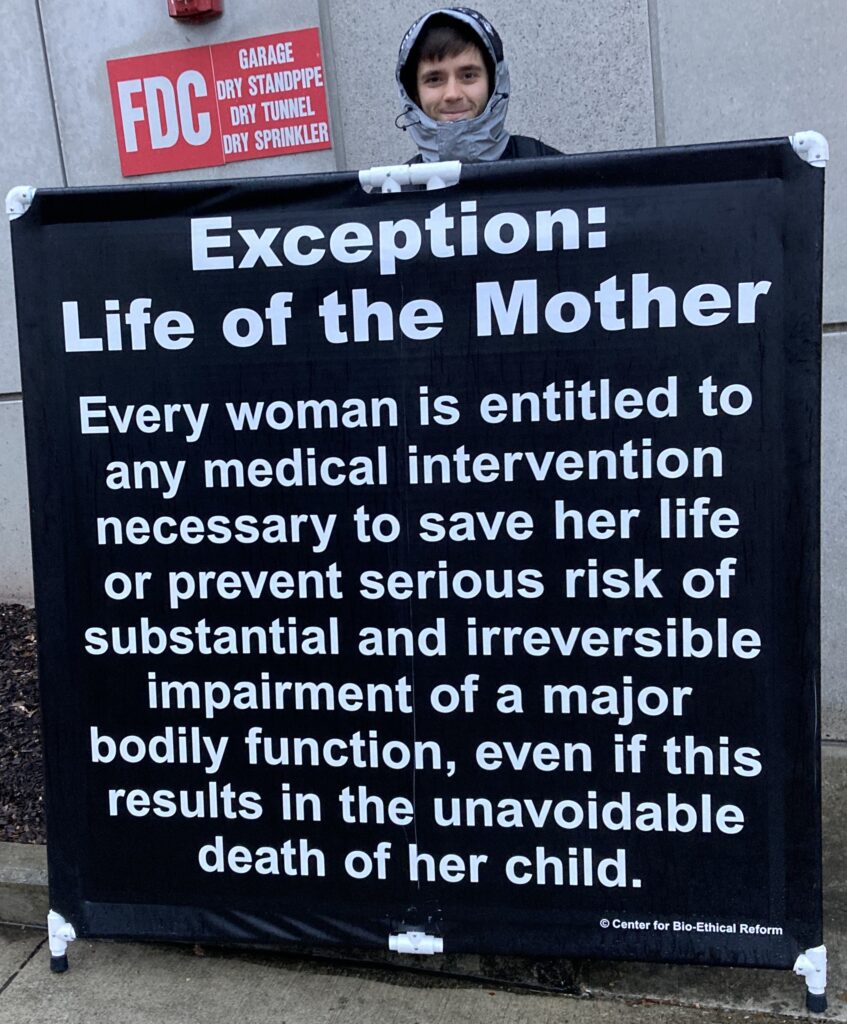Life of the Mother Exception
“No abortion. No exceptions.” It’s a common statement among pro-lifers. At face value, it makes sense. Or does it?
Exceptions to what, exactly? When people say the word “abortion,” not everyone means the same thing. Before Roe v. Wade, abortion meant any termination of pregnancy accompanied by or resulting in the death of the embryo or fetus, which would include miscarriage and stillbirth.
Since Roe, the term “abortion” has come to be understood by most people as induced abortions only, thus excluding miscarriage and stillbirth. There is no distinction between procedures performed to save a woman’s life and those done only for convenience. All are abortions.
Many pro-lifers, however, insist that an abortion necessary to save a woman’s life is not an abortion. Perhaps it makes them feel more bold. Regardless of why it is said, saying “no exceptions” is confusing and disingenuous. We must be clear about what we mean, and it’s important that we use correct definitions. Otherwise, we will be misunderstood, at great cost to our own credibility and our cause.
The general public understands that the treatment of an ectopic pregnancy is, by definition, an abortion. Whatever other words you might assign to it, that procedure is the immediate cause of the child’s death. Therefore, the procedure necessary to save the mother’s life is an abortion.
When many states drafted laws restricting abortion in the wake of Dobbs, the focus became what, if any, exceptions would be allowed. These debates quickly devolved into false accusations that pro-lifers wanted to ban medical care for miscarriages and let women die from ectopic pregnancies. Nothing could be further from the truth, but we saw many pro-lifers talking past our opponents because they were unwilling to use the correct definition of abortion, and therefore clouding the definition of exception.
Our new sign quotes almost verbatim from Tennessee House Bill 883, which states that abortion is not criminal if the termination of pregnancy “was necessary to prevent the death of the pregnant woman or to prevent serious risk of substantial and irreversible impairment of a major bodily function.” TN HB883 goes on to explain that threats of suicide or self-harm or any reason relating to mental health do not qualify.
So, how would this policy be applied? Here are three commonly raised scenarios:
- If the complication arises early in pregnancy (e.g. an ectopic pregnancy), unfortunately, nothing can be done to save the child’s life. If no action is taken, both mother and child die. The only pro-life response is to save the life you can.
- If the complication arises later in pregnancy (after about 24 weeks), the mother can deliver prematurely, and appropriate efforts will be made to save the child.
- If the mother has uterine cancer, she may act heroically to carry the baby until the age of viability, even if the growing cancer imperils her own life. However, such a sacrifice cannot be required by law. She must be allowed any medical intervention necessary to save her own life.
Medical professionals must act in good faith when making medical judgments. Even if laws with exceptions were not properly applied, however, we would still oppose a legal solution that denies women legitimate life-saving medical care.
Pro-abortion advocates wish to label our side as uncaring toward pregnant mothers with serious medical problems. By clarifying the life of the mother exception, we affirm the value of both mother and child.

Tags: abortion debate, anti-abortion, CBR, Center for Bio-Ethical Reform, pro-life debate, prolife, right to life
This entry was posted on Tuesday, September 17th, 2024 at 1:10 pm and is filed under Pro Life, Pro Life Activism, Pro Life Apologetics, Pro Life in America, Pro Life Strategy, Pro-Life in Tennessee. You can follow any responses to this entry through the RSS 2.0 feed. You can leave a response, or trackback from your own site.



